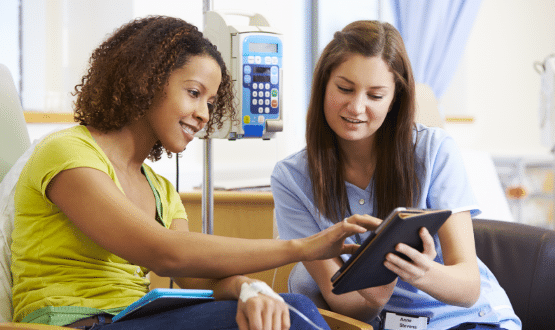How tech can transform the delivery of oncology care
- 20 December 2023

Greater use of digital solutions could relieve the enormous pressure on cancer services, improve outcomes and personalise care, says consultant oncologist Penny Kechagioglou
With around 3 million people living with cancer in the UK – a number expected to rise to 3.5 million by 2025 – the demand for cancer care is saturating workforce capacity, resulting in long waiting lists.
In August 2023, only 63% of people starting treatment did so within 62 days of an urgent cancer referral; the target is above 85%.
In addition, a recent cancer patient experience survey showed that only 71.7% of cancer patients in England were able to discuss their needs or concerns prior to their treatment. This demonstrates the magnitude of the clinical unmet need to empower patient decision-making and offer a more personalised approach to care.
There are three aspects of oncology care, where technological innovations could add value and transform the way we deliver care.
1. Prevention
With one in four cancers being due to lifestyle choices, such as smoking and drinking alcohol, there is huge scope to utilise digital technology to promote lifestyle change and prevention.
The integration of a healthy lifestyle and complementary approaches to care with traditional oncology care (known as integrative oncology) can improve patient quality of life, health and wellbeing, and resilience during and after cancer treatment.
Digital technologies can optimise the adoption of healthy nutritional habits, personalised physical activities, tips for good quality sleep, and relaxation and stress-relief methods. One example is the use of the Oncio (integrative oncology in action) App, which has been designed by clinicians and cancer patients. Launched in June 2023 in the UK, it is used by thousands of cancer patients worldwide. Patients can trust the free to use app to offer evidence-based and up-to-date information.
Community development and the power of peer-support can be enhanced through digital technology. It is also a means for cancer patients to consult their clinical team, receive clinical information and educational materials, as well as reminders and nudging tools such as screening appointment SMSs, alerts for blood tests and healthy lifestyle tips.
The increase in online health coaching in the last few years gives an opportunity for cancer patients and survivors to engage with behavioural change experts to overcome addictions and lifestyle risk factors. Meditation, yoga, and guided relaxation techniques can also be delivered effectively through digital means.
Healthcare professionals’ interactions with cancer patients can be timely and much more effective through digital means. In a 2017 study, remote patient monitoring was shown to prevent the deterioration that leads to hospitalisation, improving overall survival of cancer patients at one year by 6.5% (Basch et al, JAMA).
Patient reported outcome measures can be easily recorded through digital means using remote questionnaires; these can guide healthcare professionals when they make treatment changes and help them to tailor treatments to individual patients.
2. Prediction
The NHS holds much important data about cancer patients, including screening images, family and personal histories, sociodemographic data and lifestyle habits, genetic and genomic tests, and histological data, which together can predict the risk of developing cancer, treatment responses and long-term outcomes.
Machine-learning and artificial intelligence tools can enable clinicians to analyse that data to risk stratify individual cancer patients and patient populations, in terms of low and high risk for cancer recurrence. Such knowledge can enable more risk-stratified screening and surveillance programmes, reducing healthcare costs and improving patient experience.
Another benefit from risk-predicting is the use of appropriate diagnostic means to catch cancers early, improving the chances of survival and avoiding the cost of from cancer is highest when it is diagnosed early and the cost of advanced-stage treatments.
When cancer patients undergo treatments such as chemotherapy and radiotherapy, remote monitoring technologies can be used to triage patients who may present with treatment-related complications. The use of digital decision-making tools to predict patient deterioration, means that patients can received evidence-based treatment much earlier, avoiding unnecessary hospitalisations.
Population health management tools can predict patient outcomes, helping to stratify which patients need closer follow-up and which ones could be discharged to patient-initiated follow up schemes.
3. Personalisation
The digitisation of health records has led to more cancer patients having online access to their medical record and tests. In addition, the NHS App and other patient portals have enabled patients to access their clinical letters and clinic appointments, as well as message directly their clinical teams.
Accessing all medical information in one place means that cancer patient care can be fully integrated, with patients receiving timely care wherever they are, without the need to repeat their personal history or wait for information. Healthcare professionals working with cancer patients are also empowered when they can access clinical information in one place.
Digital technologies allow patients to access and complete questionnaires regarding their care experiences and symptoms before they come to clinic. This saves time for clinicians and releases time to care.
Other benefits for patients include being able to consult their healthcare professional remotely and book or change their clinic appointments, based on their personal circumstances.
Cancer patients can also use digital technologies to access hospital and clinic outcomes and statistics, which can help them make an informed choice about where they want their treatment to be delivered.
Digital technologies which are linked with patient electronic health records can accurately screen cancer patients for clinical trial eligibility. More cancer patients can have access to potentially life-saving research as a result.
Adoption and spread of digital tech in cancer care
The barriers to the adoption and spread of digital technologies in cancer patient populations, include the variable levels of digital literacy amongst cancer patients and healthcare professionals, and the shortage of digital training programmes.
Design-thinking expertise, and time to engage cancer patients and clinicians in the design of digital tech tools, is also lacking within healthcare organisations. Although technological innovations have transformed the way we deliver oncology care, especially through the use of remote consultation tools during and after the covid pandemic, we are still a long way away from getting cancer patients to routinely adopt digital technologies.
Despite patient portals having been established in most healthcare environments in developed countries, only about a third of patients use them consistently.
Any technological implementation should be co-created with key stakeholders and add value to its customers. The latter should be evaluated through defined outcome measures.
 Penny Kechagioglou is CCIO, deputy chief medical officer, and consultant clinical oncologist at University Hospitals Coventry and Warwickshire, as well as vice-chair of Digital Health’s CCIO Advisory Panel.
Penny Kechagioglou is CCIO, deputy chief medical officer, and consultant clinical oncologist at University Hospitals Coventry and Warwickshire, as well as vice-chair of Digital Health’s CCIO Advisory Panel.




1 Comments
I’m totally blown away by this write-up. Fantastic work!
https://sdcasinoreview.com/
Comments are closed.